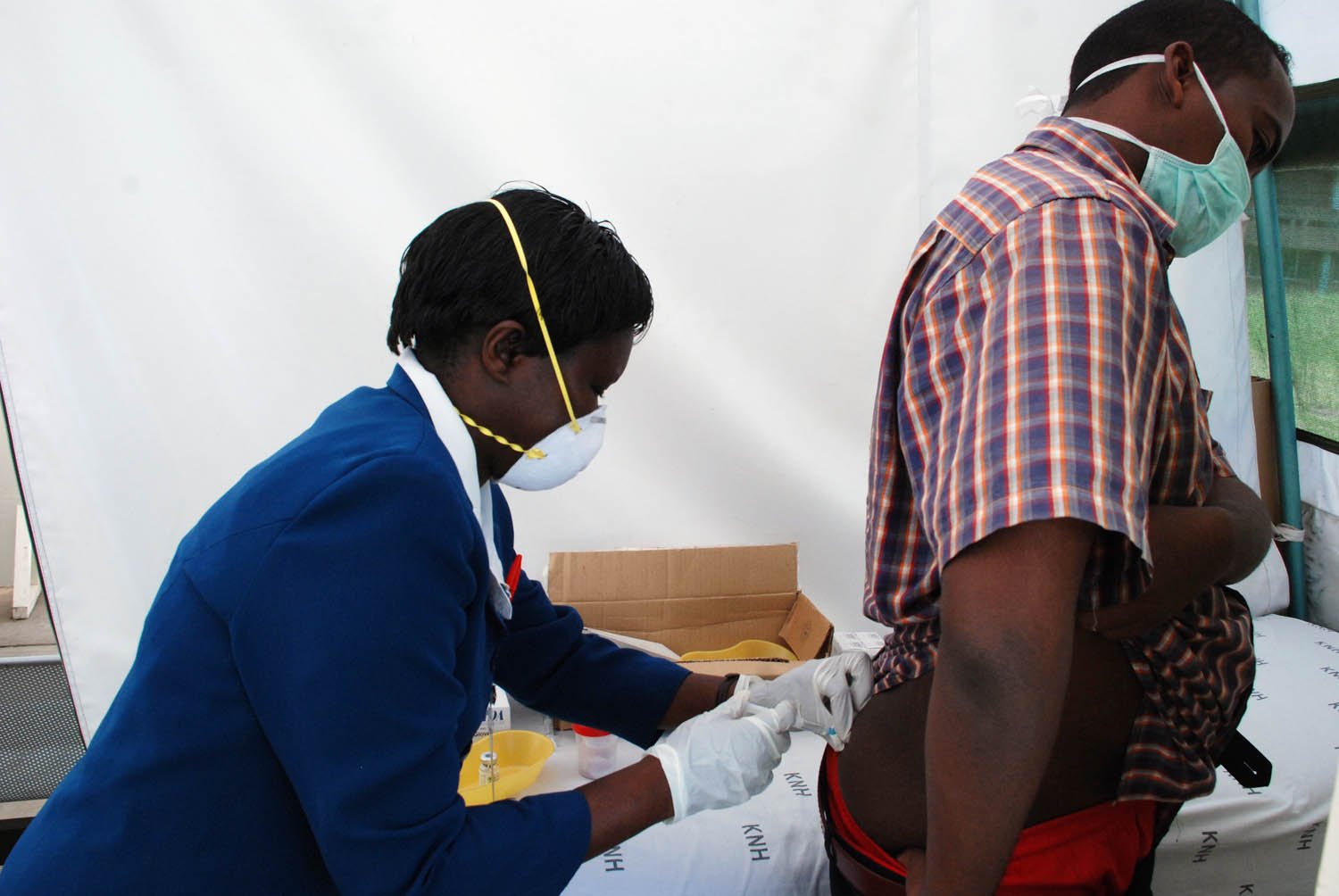Deadly underdog
Despite interest from the Bill & Melinda Gates Foundation, the public-private donor Global Alliance for Vaccines and Immunization (GAVI) and the Global Fund to fight AIDS, Tuberculosis and Malaria, the US-based Aeras Global TB Vaccine Foundation told IRIN tuberculosis is still a funding underdog.
“People largely think it is disease of the past,” said an Aeras director, Peg Willingham. “When antibiotics became available in the 1960s, TB was considered as having been eliminated as an important health problem in the United States, which is a huge drug market for pharmaceuticals. That left little financial incentive for pharmaceuticals to invest in research.”
When private interest slumped, governments and donors increased support to non-profit organisations. The Gates Foundation has funded 52 projects over the past decade worth $743 million, $300 million of which went to Aeras.
| Facts on TB |
|
|
31% all newly diagnosed cases are in Africa |
|
| Africa has 13 out of 15 highest incidence countries | |
| 14.8% new TB cases were HIV-positive | |
| 1.7 million TB sufferers died | |
| Source: WHO, 2007 | |
“It is a race and right now TB is winning. We have only begun to start harnessing the tools,” Willingham said. “It is possible to catch up with new drugs, diagnostics and vaccines, but TB always gets worse in economic downturns.”
Both World Bank and WHO have conducted research showing that TB, which is transmitted through air particles and is spread most quickly in tight living quarters, becomes more fatal in prolonged economic slumps.
Industrialisation
Tuberculosis not just a disease bred by economic destitution, it is also a result of industrialisation, said Jerald Sadoff, Aeras's president and CEO. “Rapid industrialisation has historically provided fertile grounds for the spread of tuberculosis.”
The current TB vaccine, Bacille Calmette-Guérin (BCG), first administered in the 1920’s, is not considered effective in protecting adults and can be lethal for young HIV patients with weak immune systems, according to WHO. “A new vaccine is urgently needed, but the funding is precarious,” said Sadoff.
He added that multimillion-dollar clinical trials are difficult to undertake in the middle of an economic recession. “But we also know that every year there is not a vaccine, another 1.7 million lives are lost.”
From vaccine discovery to licensure, it can take up to 15 years for a vaccine to reach developing countries, according to WHO.
Aeras estimates producing a vaccine can cost more than one billion dollars. “With every vaccine candidate that makes it to phase III clinical trial [final step before licensure], we have to build a completely new factory.” Sadoff told IRIN. “A vaccine is not like a drug; the biological conditions per vaccine demand a different production structure, which costs up to half a billion dollars to construct.
Candidates
The only vaccine to have made it through the most advanced clinical test thus far is one created by the US-based Dartmouth University led team of researchers - not funded by Aeras - that in October 2008 presented results from its seven-year clinical trial in Tanzania with 2000 HIV patients. Patients in the clinical trial who received the vaccine had a two percent lower infection rate than those who did not.
The study’s leader, Ford Von Reyn, told IRIN on 24 March that the study on the vaccine, called the 'M-vaccae-based vaccine', had positive results and he is awaiting publication of the trial’s results before further discussing vaccine development plans. In October 2008, he told journalists the vaccine would be cheap to produce and could be in use by 2011.
A quarter of all TB deaths in 2007 were HIV-related, according to WHO.
There are 50 additional tuberculosis vaccines being tested, according to WHO, with two expected to enter phase III trials in 2011.
Aeras told IRIN that one of the vaccine candidates it is funding - researched in collaboration with Oxford University - is enrolling 2,700 children in South Africa in 2009 to see if the vaccine should proceed to phase III.
This vaccine would become a booster vaccine to increase efficacy of the BCG vaccine. Aeras estimates that if it is able to find funding, it can debut a safe - even for HIV patients - and effective vaccine by the year 2016.
“It is all about balancing risks,” said Aeras’s president Sadoff. “We are racing time to discover a vaccine, but we only have so much time and money. This is a delicate and difficult balance. If I had unlimited resources, I would go straight to phase III in the hopes of saving lives sooner. But that is $120 million and we need to gauge the financial risks too.”
pt/aj
This article was produced by IRIN News while it was part of the United Nations Office for the Coordination of Humanitarian Affairs. Please send queries on copyright or liability to the UN. For more information: https://shop.un.org/rights-permissions





